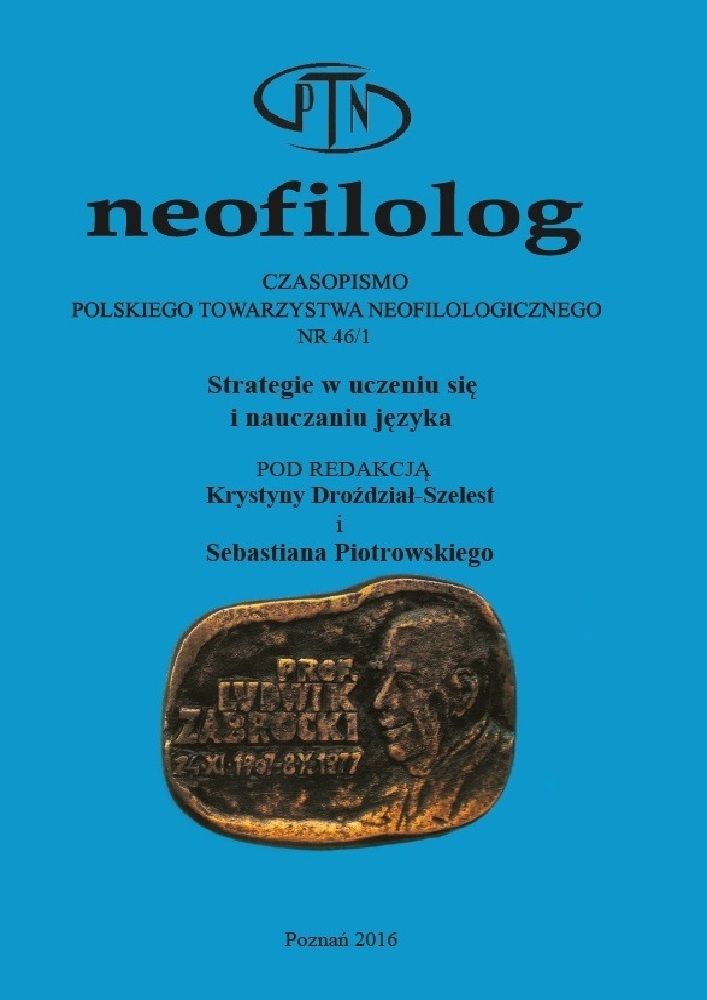Résumé
Although language learning strategy research has been going on for almost forty years and has provided both theorists and practitioners with an abundant body of knowledge on the subject, there are still areas that need further investigation. One such area is the use of strategies in language skills development, with the skill of writing being singled out as deserving special attention. It is suggested that in order to better understand the processes involved, we need more information concerning the development of the skill by learners, as well as more data revealing the effects of strategy based instruction, especially with reference to children and adolescents in different foreign language learning contexts.
Hence, this article makes an attempt to contribute to the ongoing discussion by focusing on a special group of learners – poor language learners, at a risk of educational failure – who are learning a foreign language (English) in the context of junior high school. The article consists of two parts: its theoretical sections focus on some issues related to poor language learners, with emphasis on factors impacting their school problems in general and learning of the writing skill in particular. Then, based on the literature review, some research findings concerning writing strategies and the effects of strategic training are discussed. The second part presents and comments on the data obtained during the course of an informal study carried out in a junior high school within the framework of an educational project which was remedial in character.
Références
Anderson, N.J. 2008. “Metacognition and good language learners”. (in) Lessons from Good Language Learners. (ed. Griffiths, C.). Cambridge: Cambridge University Press: 99-109.
Bloom, M. 2008. “Second language composition in independent settings: supporting the writing process with cognitive strategies”. (in) Language Learning Strategies in Independent Settings. (eds. Hurd, S. and Lewis, T.). Bristol: Multilingual Mat-ters: 103- 118.
Chamot, A.U. 2001. “The role of learning strategies in second language acquisition”. (in) Learner Contributions to Language Learning (ed. Breen, M.P.). Harlow: Pearson Education: 25-43.
Cohen, A.D. 2011. Strategies in Learning and Using a Second Language. Harlow: Pear-son Education.
Cohen, A.D. and Macaro, E. (eds.). 2007. Language Learner Strategies. Oxford: Oxford University Press.
Cottrell, S. 2001. Teaching Study Skills and Supporting Learning. London: Palgrave.
Griffiths, C. (ed.). 2008. Lessons from Good Language Learners. Cambridge: Cambridge University Press.
Griffiths, C. 2013. The Strategy Factor in Successful Language Learning. Bristol: Multi-lingual Matters.
Ellis, G. and Sinclair, B. 1989. Learning to Learn English. A Course in Learner Training. Cambridge: Cambridge University Press.
Gordon, L. 2008. “Writing and good language learners”. (in) Lessons from Good Lan-guage Learners (ed. Griffiths, C.). Cambridge: Cambridge University Press: 244-254.
Harmer, J. 1998. How to Teach English. Harlow: Addison Wesley Longman.
Manchón, R.M., de Larios, J.R. and Murphy, L. 2007. “A review of writing strategies: focus on conceptualizations and impact of first language”. (in) Language Learner Strategies (eds. Cohen, A.D. and Macaro, E.). Oxford: Oxford University Press: 229-250.
Miller, S. 1996. “Introducing study skills”. English Teaching Professional, October 1996, Issue One: 19, 28.
Neuburg, R. and Harris, V. 2003. Jak się uczysz. Przewodnik dla uczącego się języka obcego. Kaunas: Technologija.
Neuburg, R. and Harris, V. 2003. Learning My Way. A Handbook on Language Learn-ing Strategies. Kaunas: Technologija.
O’Malley, J.M. and Chamot, A.U. 1990. Learning Strategies in Second Language Acqui-sition. Cambridge/New York: Cambridge University Press.
Oxford, R. 2008. “Hero with a thousand faces: learner autonomy, learning strategies and learning tactics in independent language learning”. (in) Language Learning Strategies in Independent Settings (red. Hurd, S. and Lewis, T.). Bristol: Multilin-gual Matters: 41-63.
Rubin, J. and Thompson, I. 1994. How To Be a More Successful Language Learner. Boston: Heinle & Heinle.
Vann, R.J. and Abraham, R.G. 1990. “Strategies of unsuccessful language learners”. TESOL Quarterly 24/2: 177-98.
Wenden, A. 1991. Learner Strategies for Learner Autonomy. London: Prentice Hall.
Wenden, A. 2001. “Metacognitive knowledge in SLA: the neglected variable”. (in) Learner Contributions to Language Learning (ed. Breen, M.P.). Harlow: Pearson Education Limited: 44-64.
Licence
© Krystyna Droździał-Szelest, Mirosława Anna Domińska 2018

Ce travail est disponible sous licence Creative Commons Attribution - Pas de Modification 4.0 International.
Auteurs :
Les auteurs de textes acceptés pour publication dans la revue Neofilolog sont tenus de remplir, signer et renvoyer à l'adresse de la rédaction, un accord sur l'octroi d'une licence gratuite pour les œuvres, avec obligation d'accorder une sous-licence CC.
En vertu de cet accord, les auteurs des textes publiés dans la revue Neofilolog accordent à l'Université Adam Mickiewicz de Poznań une licence non exclusive et gratuite et permettent l'utilisation de la sous-licence Creative Commons Attribution-NoDerivatives 4.0 International (CC BY-ND 4.0).
Les auteurs se réservent le droit de disposer librement de l'œuvre.
Utilisateurs :
Les utilisateurs d'Internet intéressés ont le droit d'utiliser les œuvres publiées à partir de l'année 2017 sous réserve des conditions suivantes :
- reconnaissance de la qualité d'auteur - l'obligation de fournir des informations sur la qualité d'auteur, le titre, la source (liens vers l'œuvre originale, DOI) et la licence, ainsi que l'œuvre distribuée ;
- sans créer d'œuvres dérivées - l'œuvre doit être conservée dans sa forme originale, p. ex. les traductions ou les interprétations ne peuvent être distribuées sans le consentement de l'auteur.
Tous les textes publiés sont soumis au droit d'auteur.
Autres :
L'Université Adam Mickiewicz de Poznań se réserve le droit à la revue dans son ensemble (mise en page, forme graphique, titre, conception de la couverture, logo, etc.).
.
